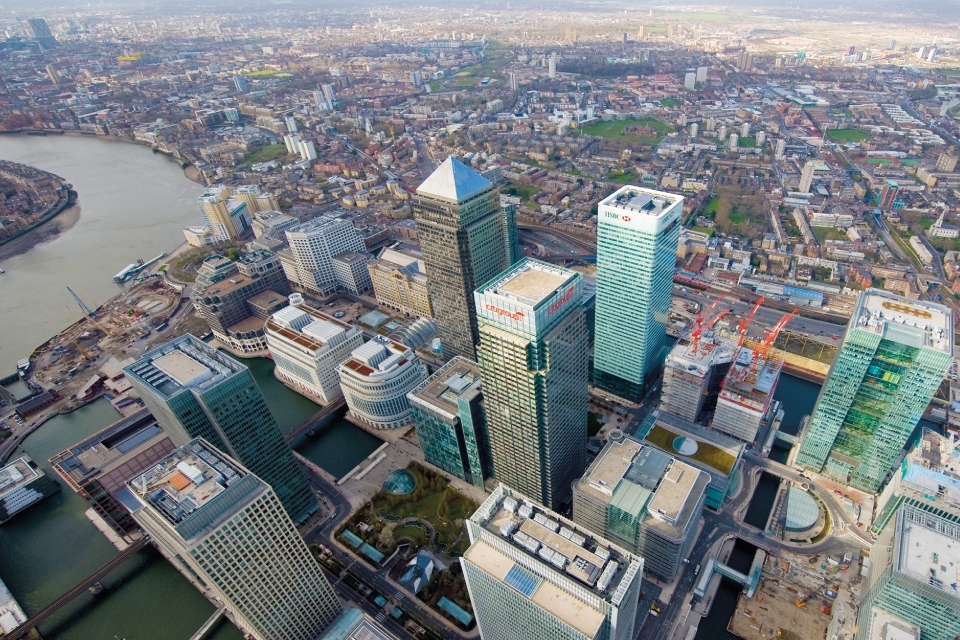Building excellence: world class construction capabilities (online/web version)
Published 9 February 2015
UK construction: leading the way
The UK is a world-leading provider of construction goods and services working in partnership with private and public-sector clients across the globe.
It is a true pioneer in construction innovation, offering world-class expertise and leadership in addressing the growing global demand for low carbon and sustainable building.
Employing 3 million people in 280,000 businesses, construction is one of the largest sectors of the UK economy and covers a wide range of areas where the UK has a strong competitive edge.
Globally recognised for its experience in city planning and development and urban regeneration, the UK is the ideal partner for major construction projects worldwide.

Building © Getty
Expertise across the board
- design and planning: Innovative and sustainable, UK construction design leads the world
- consulting: UK construction consultants are active across the globe
- regeneration: The UK has world-class experience in transforming urban environments
- green cities: UK companies are working on green-city projects both at home and abroad
- building: The UK is home to one of Europe’s most successful contracting sectors
- roads, bridges and tunnels: The UK offers unrivalled capability in the construction of transport infrastructure
- construction products: The UK is a major exporter of the products needed for modern construction developments
Design and planning
The UK is in high demand worldwide for professional construction services such as design and planning.
16,000 UK firms in the design and planning area.
£4.2 billion generated annually by this sector.
70% forecast growth of the global construction industry by 2025.
£27 billion expenditure and investment in Research and Development (R&D) in the UK in 2012.
The UK has a global reputation for pushing the boundaries of architectural design.

Design © iStock, Tom Merton
Innovation
The UK has a global reputation for pushing the boundaries of architectural design. This is made achievable by the country’s world-leading research community, first-class structural and geotechnical expertise and the development of market-leading specialist materials and products. The UK has a relatively higher proportion of patents related to construction than other G7 and BRIC countries.
Sustainable design
UK design and planning firms are well placed to help countries across the globe in their shift to low carbon economies. The UK government, through the Technology Strategy Board, has been supporting the UK construction industry over the last 5 years to enable the UK to be a world leader in the design of green and sustainable buildings that deliver greater energy efficiency both in their construction and operation.
Construction 2025
Innovation in UK construction and design is also supported by initiatives such as the Construction 2025 Industrial Strategy. This partnership between industry and government aims to help the UK lead the world in construction-related research and innovation and fully embrace the transition to a digital economy and the rise of smart, sustainable building.
Case study
M&S Cheshire Oaks
UK companies such as Gleeds, Aukett Fitzroy Robinson, Faithful + Gould, Oaksmere Design and Simons Group made up the project team that designed Marks & Spencer’s Cheshire Oaks Store, one of the most sustainable stores in the world. Its design and architectural strategy addressed several aspects of sustainability, making it highly carbon efficient, materially innovative and biodiverse. The design team achieved 30% recycled content by value, including 40% recycled ceramic floor tiles, 100% recycled aluminium roof and fermacell dry-lining board.
Consulting
UK consultancy firms are active across the globe and leading on some of the largest and most prestigious construction projects.
£2 billion: value of UK consultancy exports.
Internationally renowned for their skills and capabilities across the construction life cycle, UK consultants are engaged around the world by clients that recognise the value their output brings.
UK consultancy firms are leading on some of the world’s largest and most prestigious construction projects.

Consultants © iStock, Mott MacDonald
Breadth of expertise
UK consultants provide a range of services, including:
- strategic advice and analysis
- R&D
- climate adaptation
- urban planning
- public policy advice
- demand forecast and modelling
- scheme identification
- feasibility studies
- technical and environmental appraisal
- materials technology
- routine inspection and maintenance
- accessibility
- performance and cost management
- project management
- detail design
- procurement
- construction management
Case study
Mott MacDonald
UK-based consultancy firm Mott MacDonald is advising India’s National Highways Authority on a number of road construction and upgrade projects, with a specific focus on safety. Activities include design, tender preparation and construction supervision, for urban, inter-urban and industrial-estate road systems.
Regeneration
As the first industrialised nation, the UK has immense experience in urban regeneration.
In recent years, UK expertise has helped to transform cities such as Birmingham, London, Manchester and Newcastle, creating stronger local economies, employment opportunities and social benefits.
These skills are now being exported globally, with the UK’s construction sector working with partners across the world on large-scale regeneration and rejuvenation programmes.

Docklands
Urban planning
The UK has very strong expertise in urban planning – the optimisation of the effectiveness of a community’s land use and infrastructure. Urban planners in the UK are globally renowned for their ability to formulate plans for the development and management of urban and suburban areas, analysing land-use compatibility as well as economic, environmental and social trends, whilst at the same time considering issues such as sustainability, air pollution, traffic congestion, crime, land values and legislation.
Public Private Partnerships
A key factor in the UK’s successful track record in regeneration has been its pioneering use of Public Private Partnerships (PPP) to share the risks and costs of urban infrastructure development between the public and private sectors.
Urban planners in the UK are globally renowned for their ability to formulate plans for the development and management of urban and suburban areas whilst at the same time considering issues such as sustainability.
The new Nine Elms development will regenerate the area around Battersea Power Station, London:
- 25,000 new jobs
- 18,000 new homes
- over 600,000m2 of new office space
Case study
London Docklands
One of the biggest regeneration projects in the UK in recent years has been that of London’s Docklands. The formerly deprived and largely derelict area has been transformed over the last three decades, becoming both a major business and financial centre and an increasingly desirable area to live. The development of the London 2012 Olympic Park in Stratford was arguably the highpoint of this renaissance, and will leave a positive legacy for generations to come.
Green cities
The UK is a leader in green and sustainable cities – cities that aim to deliver improved environmental performance by minimising carbon, increasing the use of renewable energy sources, and maximising the efficient use of resources.
£117 million funding for innovation in sustainability in the last 5 years.
22.8% projected annual growth rate of the sustainable building industry globally.
The effective development and implementation of green cities and sustainable building projects involves a complex set of skills and expertise. The UK construction sector has these capabilities in abundance.

Getty (© ImageGap)
Success in sustainability
The UK has strong practical experience of working on green city projects both at home and across the globe, bringing the know-how, technology and business models necessary to achieve sustainable development.
The UK has a proud track record in the provision of sustainable architectural and design services, as well as in the professional engineering services that are essential to achieve high-quality building performance.
The UK’s BRE has developed BREEAM, a world-leading standard for the assessment and rating of the environmental performance of buildings.
Ensuring that sustainable construction projects are delivered on time and budget, and to the quality required, is another particular strength of UK companies, and these services are now being provided in many green city projects around the world.
Green buildings cannot be constructed without high-quality sustainable products and materials. UK companies continue to develop and supply such innovative products – often working closely with overseas partners.
To be successful, green cities require intelligent and ‘smart’ buildings. The UK provides the world-class building management and control systems needed to make this a reality.
China activity
UK expertise in green cities has been in particular demand in China in recent years. With the continuing expansion of the Chinese economy and rapid urbanisation, creating solutions for sustainable development is a key focal-point for government and business alike and there is a strong commitment to developing an effective sustainable cities and green building programme.
The UK has long been recognised in China as holding a leadership position in this area, and over the past decade a close working relationship has developed.
The UK has a proud track record in the provision of sustainable architectural services.
Case study
Atkins
UK consultancy Atkins is playing a key role in the design of green cities in China. Its masterplan for Meixi Lake, in Changsha, represents a sustainable city model and is positioned to be ‘the future centre of Xiangjiang City’ with an expected population of over 200,000 people. Currently in its implementation phase, Meixi Lake embodies the spirit and objectives of an ecological city, maximising opportunities through transport infrastructure and promoting a development strategy of high-density core areas, a new central business district as well as 7 character districts.
Building
The UK has one of Europe’s biggest and most successful construction contracting sectors, with a world-class reputation for the construction of buildings, roads, tunnels, bridges and specialised construction activities.
2 million people employed by UK building contractors.
£63 billion generated annually by the UK contracting industry.
World leading: development of BIM software.
234,000 UK contracting companies.
Balfour Beatty, Mace, Carillion and Laing O’Rourke are just some of the many UK contracting companies that have won contracts overseas, with international clients increasingly attracted by their expertise, experience and ability to provide low carbon, resource efficient and climate-resilient solutions.

Salford Quays
Industry statistics
The contracting industry is the largest sub-sector of the UK construction sector, accounting for about 70% of its total value added and almost 70% of its jobs. It employs over 2 million people in around 234,000 businesses and generates £63 billion each year.
The UK construction contracting workforce is increasingly skilled and educated – the proportion of employees with a degree or equivalent qualification has almost doubled over the last decade.
Sector specialisms
The UK contracting sector offers expertise in the following areas:
- construction of buildings: commercial and residential
- civil engineering: roads, railways, tunnels, bridges and utilities
- specialised construction activities: electrical and plumbing installation; demolition and site preparation; plastering, painting and roofing.
Case study
The Shard
The Shard at London Bridge Quarter is the tallest building in Western Europe. The 310m high iconic tower has redefined the London skyline and is already an international symbol for London. It comprises world-class office space, exclusive residences, The Shard Arcade, the 5-star Shangri-La Hotel, The View from The Shard which has welcomed over one million people to the viewing platform since it opened in February 2013, and three award-winning restaurants welcoming up to 6,000 people a day.
Delivering Europe’s tallest tower rapidly and safely required engineers WSP to work closely with architect Renzo Piano, developer Sellar Property and contractors Mace to develop innovative new construction techniques. And to be achieved on a relatively tiny site of just over one acre. The result is a world-class building, constructed safely over just 44 months adjacent to one of London’s major transport hubs, London Bridge station.
Roads, bridges and tunnels
The UK has internationally-renowned expertise in the construction of roads, bridges and tunnels – fundamental parts of a country’s transport infrastructure.
400,000km of publicly maintained road in the UK.
4 million vehicles using UK roads daily.
42km of new tunnels being built under London as part of the Crossrail project.
The UK’s skills in the construction of roads, bridges and tunnels are in demand across the world as nations recognise the economic, social and environmental benefits of having an effective transport network.

Bridge
Roads
The UK has developed world-leading capability to meet the challenges of providing an efficient and effective road network on a small and congested island. With almost 400,000 kilometres of publicly maintained highway, used by some four million vehicles daily, the UK excels in all aspects of road infrastructure, from planning, design and project management, to construction, operation and maintenance. This helps to enhance capacity, reduce congestion and improve safety for road users and workers.
Bridges and tunnels
The UK has expertise worldwide in the planning, design and project management of bridge and tunnel construction projects. These are increasingly regarded as the key to sustainable development as nations wrestle with the demand of growing and more urbanised populations.
Over the next 5 years the UK bridges and tunnel construction industry is forecast to grow by more than 8 per cent annually, boosted by initiatives such as Crossrail, Europe’s biggest construction project, which involves the creation of 42 kilometres of tunnels beneath the busy streets of London. The industry consists of around 375 contracting firms, including Balfour Beatty, Morgan Sindall, Costain, Bechtel and Royal BAM Group, all of them at the cutting edge of innovation.
Building Information Modelling
The UK has a global reputation for the implementation of technology for construction purposes such as Building Information Modelling (BIM) software – a pioneering process that can unlock more efficient methods of designing, delivering and maintaining physical built assets. BIM embeds key product and asset data and a 3D computer model that can be used for the effective management of information throughout an asset’s lifecycle – from earliest concept through to operation. Described as a game-changing process for the construction sector, BIM has great value in retrofit and refurbishment projects where complementary technologies such as laser survey techniques and rapid energy analysis are employed.
Case study
WSP
Leading UK design and engineering consultancy firm WSP recently provided its expertise to design the 731m-long Tran Thi Ly bridge in Da Nang, Vietnam. The company was involved in the basic architectural and detailed engineering design for the imposing concrete cable-stayed structure, which spans Da Nang’s Han River and opened in 2013. The bridge’s innovative design has won several international awards.
Construction products
The UK has a highly successful construction products sector, with an annual turnover of over £50 billion.
£6 billion construction products and materials exported from the UK annually.
World leading environmentally friendly products for sustainable construction.
35 million tonnes of pre-cast concrete products manufactured annually.
£648 million paints and varnish exports generated in 2013.

Construction
UK companies produce the whole range of products, components and materials that are needed for modern construction developments, both domestically and overseas.
In many areas, these companies are world leaders and more than £6 billion of construction products and materials are exported from the UK annually. In particular, the UK is leading the way in developing environmentally friendly products to address the growing global demand for low carbon and sustainable construction.
Steel and aluminium
The UK is a world-leading supplier of structural steel, steel tubes, hollow section and aluminium. Total exports sales in 2013 stood at £789 million.
Precast concrete
The UK precast concrete sector has an estimated value of some £2 billion. It excels in the manufacture and supply of concrete blocks and bricks, roof tiles, paving, prefabricated concrete products and pipes, with exports worth around £50 million each year.
Paints and varnishes
The range of paints that is exported from the UK is extensive, including decorative coatings, oil coatings for steel and corrosion-resistant coatings for structural steelwork. Exports stood at £648 million in 2013, with the UK’s success driven by high quality, technical superiority and innovation.
Clay products
The UK is a specialist supplier of clay products, including bricks, roofing tiles and pipes. Overseas sales are worth around £10 million annually.
Copper tube
UK manufacturers of copper tube have an outstanding reputation as leading suppliers of reliable, high-quality products to a large domestic and international market. Exports stood at £126 million in 2013.
Heat and power products
UK companies offer a wide-ranging portfolio of energy-efficient appliances and technology, from central-heating boilers and hot-water heating and storage units, to advanced air and power management systems for commercial and industrial buildings and processes.
Mechanical and electrical products
The UK excels in the development of innovative technologies that produce energy efficient and environmentally friendly solutions in heating, ventilation, building management, refrigeration and air-conditioning systems.
Fire protection
The UK is globally regarded as the most innovative developer of fire-protection solutions for commercial building problems, with UK systems and technology in evidence throughout the world. Exports were worth £194 million in 2013.
Plastics
The UK is an innovative and growing force in the international plastics sector. Operating at the cutting edge of technology, it exports around £600 million worth of plastic construction products each year.
Safety equipment
Health and safety considerations are paramount in the UK construction industry. It is therefore home to many producers of high-quality safety equipment and ancillary products designed to safeguard staff on construction sites.
Case study
Fusionopolis
Recent overseas projects involving UK steel companies include the 24-storey media and science research hub known as Fusionopolis in Singapore. Fusionopolis saw London-headquartered Corus beating off fierce competition from European and Asian rivals to supply over 12,000 tonnes of sections and 2,000 tonnes of plates from its UK-based steel mills.
Annual exports by sector
| Product | Value | Date |
|---|---|---|
| Steel and aluminium | £789 million | 2013 |
| Precast concrete | £58 million | 2013 |
| Paints and varnishes | £648 million | 2013 |
| Clay products | £9 million | 2013 |
| Copper tube | £126 million | 2013 |
| Heat, power, mechanical and electrical products | £2 billion | 2013 |
| Fire protection | £194 million | 2013 |
| Plastics | £600 million | 2013 |
| Safety equipment | £100 million | 2013 |
Source: ONS
Industry bodies
British Expertise
British Expertise is the leading UK private sector organisation for British companies offering professional services internationally. Its member companies range from large general consultancies to specialist individuals.
Federation of Environmental Trade Associations (FETA)
FETA is the recognised UK body representing the interests of over 400 manufacturers, suppliers, installers and contractors within the heating, ventilating, building controls, refrigeration & air conditioning industry to policy makers and the wider public.
RIBA
The Royal Institute of British Architects champions better buildings, communities and the environment through architecture and our members. It provides the standards, training, support and recognition that put members – in the UK and overseas – at the peak of their profession.
Construction Products Association
The Construction Products Association represents the UK’s manufacturers and distributors of construction products and materials including 41 Trade Association members. The Association acts as the leading voice to promote and campaign for this vital UK industry.
Institution of Civil Engineers (ICE)
We rely on civil engineers every day for a variety of things: from supplying energy and clean water to our homes, to processing and recycling our waste, to finding solutions to problems like pollution.
ICE seeks to harness the creativity, energy and dedication of civil engineers to help address our needs and shape the world around us.
UK Green Building Council
The UK Green Building Council (UK–GBC) is a membership organisation campaigning for a sustainable built environment – one that minimises negative environmental impacts while maximising benefits for people everywhere.
How Department for International Trade (DIT) can help
DIT is the government department that helps UK-based companies succeed in the global economy. It also helps overseas companies bring their high-quality investment to the UK’s dynamic economy acknowledged as Europe’s best place from which to succeed in global business.
Help from DIT
DIT has professional advisors both within the UK and across more than 100 international markets. If you are a UK based company looking to develop your business in overseas markets or an overseas client looking for UK suppliers of world-class products and services, then please contact us for expert advice and practical support.
Visit: gov.uk/dit
UK Export Finance
UK Export Finance (UKEF), the UK’s export credit agency, is the government department that works with companies, banks and overseas buyers to support financing of UK exports and investments across the world. UKEF provides protection to UK exporters against payment risks and facilitates finance for them through guarantees to banks. It also supports and provides loans to overseas buyers to finance the purchase of capital/semi capital goods and services from the UK.
UK Export Finance is the trading name of the Export Credits Guarantee Department (ECGD).
Visit: gov.uk/uk-export-finance
Disclaimer
Whereas every effort has been made to ensure that the information in this document is accurate, DIT does not accept liability for any errors, omissions or misleading statements, and no warranty is given or responsibility accepted as to the standing of any individual, firm, company or other organisation mentioned.
© Crown Copyright 2014
You may re-use this information free of charge in any format or medium, strictly in accordance with the terms of the Open Government Licence.
To view this licence, visit: www.nationalarchives.gov.uk/doc/open-government-licence or e-mail: psi@nationalarchives.gov.uk.
Where we have identified any third party copyright information in the material that you wish to use, you will need to obtain permission from the copyright holder(s) concerned.
Any enquiries regarding this material should be sent to us at enquiries@trade.gov.uk or telephone +44 (0)20 7215 5000.
Published September 2014 by UK Trade & Investment.
This was published originally by UK Trade and Investment which has since moved to the Department for International Trade (DIT).
URN UKTI/14/1071
